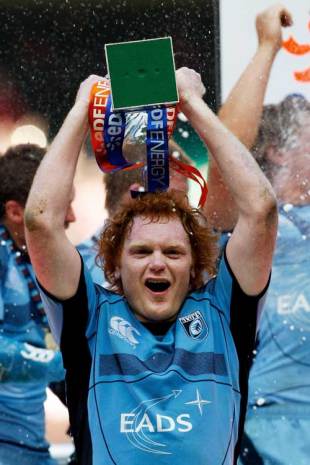|
Anglo-Welsh Cup
A victim of circumstance
Huw Baines at Twickenham
April 18, 2009

Cardiff Blues skipper Paul Tito lifts the Anglo Welsh Cup at Twickenham
© Getty Images
Enlarge
Cardiff Blues celebrated a well-deserved day in the sun at Twickenham on Saturday, with six years' hard work paying off in an emphatic 50-12 victory over Gloucester in the Anglo-Welsh Cup final. The Blues, successors to one of the most famous names in rugby, Cardiff RFC, celebrated their first silverware since their formation in 2003 and in a twist of fate may be the final name ever engraved on the current Anglo-Welsh Cup. The Welsh sides have enjoyed a great deal of success in the competition with the Ospreys winning it last season and appearing in the final the year before and the Scarlets losing the 2006 final to Wasps. But their brief spell of dominance may be ended by the overbearing pressures of the oft-referenced "current economic climate" and the twin powerhouses of the Guinness Premiership and Heineken Cup. Premier Rugby, the umbrella organisation that governs the 12 Premiership clubs, is in favour of scrapping the competition altogether and installing six more Premiership games on the weekends allotted for Anglo-Welsh fixtures. The added commercial draw of the Premiership in England would generate considerable added income for the clubs, but the proposal was dismissed out of hand by the RFU upon its first and second viewings. The Elite Player Squad (EPS) agreement, the added strain on players and their relationship with the pro-Anglo-Welsh WRU were all contributing factors. With Premier Rugby's argument in mind, the vast swathes of green signalling empty seats at Twickenham on Saturday appear to signal a death knell for the tournament. With a wholly respectable crowd of over 55,000 in the stadium the contrast with the full house that will greet May's Guinness Premiership final is still palpable. The Anglo-Welsh Cup is a victim of circumstance, a competition founded on the blood and thunder cross-border clashes that pre-date professionalism. In the cold light of day however the memory of these rivalries has not sufficiently stirred the imaginations of fans in order to balance the books for the Premiership clubs, many of whom are sweating the credit crunch as keenly as any corporate bank. Sandwiched between the Premiership, Six Nations and all-conquering Heineken Cup, coaches have been forced to rotate their squads for group games, cheapening the spectacle and deterring fans. In a frustrating Catch-22 situation, clubs have been warned off chasing the Cup by the paydays available in the latter stages of the marquee tournaments. The Welsh sides, by contrast, largely have been able to utilise their squads with games in the less all-consuming Magners League, a competition that, without wishing to cheapen its obvious competitiveness, has no relegation and an almost-guaranteed route in to the Heineken Cup for competitive sides. Blues boss Dai Young currently sees his side with one piece of silverware in the cabinet and a Heineken Cup semi-final to look forward too, yet his side are currently languishing two-from-bottom in the league with only five wins to their name. If they remain where they are, they will still qualify for the Heineken Cup. Their Anglo-Welsh success has been built on a commitment to the competition and a willingness to blend youth and experience in the Pool stages, learning from the success of the Ospreys in previous years. It is here that the Anglo-Welsh Cup shows its worth as a stepping stone for clubs looking to take another step in their development. While the financial side of the tournament is mired in trouble there is an excellent relationship with emerging sides and talent. During this season's tournament the Newport Gwent Dragons sent 22-year-old centre Ashley Smith into a cauldron at Kingsholm with the captain's armband and Cardiff Blues wing Leigh Halfpenny announced his arrival at regional level with a try against Sale Sharks in the opening round before going on to score a brace in the final. The youngsters were paired with experienced heads however, with many international players suiting up for action ahead of the autumn internationals with the pressure less great from surrounding Magners League fixtures. In a perfect world coaches would be able to fight on all fronts. This is by no means anything approaching a perfect world. With top Premiership clubs losing myriad players to international duty, the Heineken Cup producing near Test match levels of physical and emotional confrontation and the Premiership paying the bills and demanding serious focus from fans the clubs have no choice but to alleviate the pressure by using squad rotation for the Anglo-Welsh competition. As a concept it has promise, player development and history on its side. In a romantic world Wales v England ties are a fiery distillation of pride and passion, but in the modern world of professionalism the responsibility has to be maintaining the status of professional clubs. Here's hoping for a successful season of Anglo-Welsh competition next season, but don't hold your breath. © Scrum.com
|
Live Sports
Communication error please reload the page.
-
Football
-
Cricket
-
Rugby
-
- Days
- Hrs
- Mins
- Secs
F1 - Abu Dhabi GP
Abu Dhabi Grand Prix December 11-131. Max Verstappen ()
2. Valtteri Bottas (Mercedes)
3. Lewis Hamilton (Mercedes)
4. Alexander Albon ()
5. Lando Norris ()
6. Carlos Sainz Jr ()
-
ESPNOtherLive >>
Darts - Premier League
Golf - Houston Open
Snooker - China Open
Tennis - Miami Open

